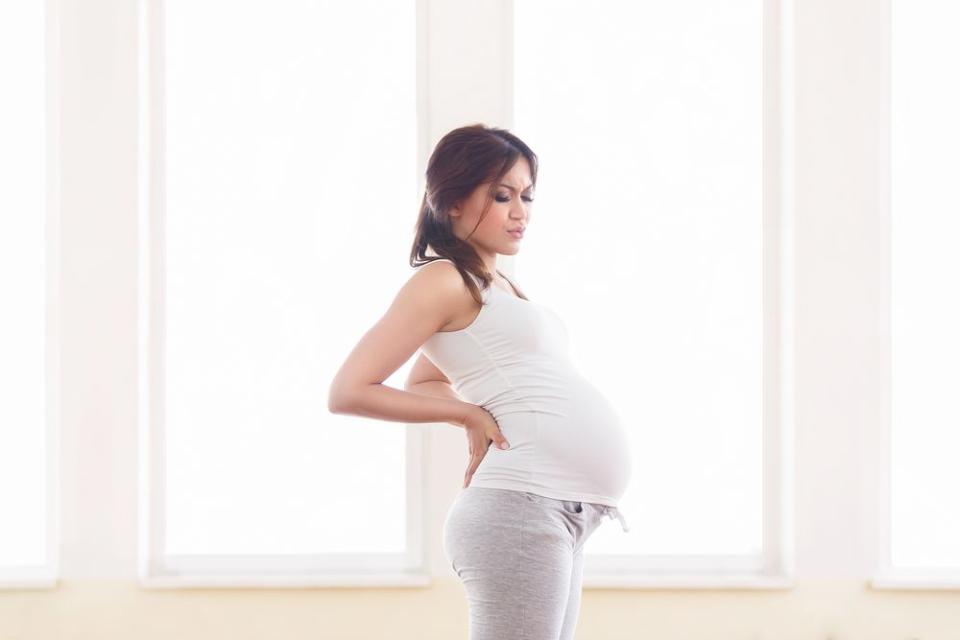How To Know If You're Having Gas or Contractions
Your growing baby can definitely mess with your digestive system. First, there's morning sickness. Then, as your changing hormones disrupt or slow the digestive process and your growing baby starts to squeeze everything in your abdomen, you may end up with gas, indigestion, constipation, and a whole host of other unsavory issues. Truly. When you're pregnant, tummy troubles abound.
But as your due date approaches, it can be hard to distinguish between gas and contractions. As in are you in labor? Learn more about how to know if that uncomfortable feeling in your belly is your baby signaling their impending arrival—or simply your lunchtime burrito causing trouble. Here's how to figure out if you're having contractions or gas.
Signs You're Having Contractions
While the pain of contractions can mimic gas pain, there are some key ways to tell them apart. You're likely having contractions if the following symptoms accompany your abdominal discomfort.
Your labor contractions have a rhythm
Contractions come in waves with breaks in between them, while gas pain is more constant. "You develop a pattern with labor contractions, where they're coming every four to five minutes and progressively getting stronger," says Paul du Treil, M.D., an OB-GYN and director of maternal and child health at Touro Infirmary in New Orleans. So, break out the stopwatch and find out if the pain is coming at regular intervals. If not, you're probably experiencing gas.
Your belly tightens up
Labor pains involve a big muscle contraction all along your abdomen. "There's an uncomfortable tightening in the stomach during labor, where the whole stomach feels hard," says Dr. du Treil. If your tummy hardens every time you're experiencing pain then softens afterwards, it's likely a contraction, not gas. On the other hand, with gas, your belly may feel full or bloated but the muscles won't be tightening in intervals.
There's more happening "down there"
True contractions usually come with a host of other symptoms. "Bloody mucus or a change in vaginal discharge increases the likelihood that it's real labor and not a false alarm," says Bart Putterman, M.D., an OB-GYN at Texas Children's Pavilion for Women in Houston. If you don't notice any other pregnancy-related symptoms besides abdominal pain, your discomfort is more likely to be due to gas or other digestive issues.

ZephyrMedia/Shutterstock
Signs You're Having Gas Pain
Gas pain is common during pregnancy due to the influx of hormones and the pressure your growing baby puts on your digestive tract. So, in the absense of specific symptoms of contractions, you're probably experiencing gas. If you're still not sure, contact your medical provider and look for these signs.
The pain is irregular and sharp
Gas will come and go on an irregular schedule. The accompanying pain will often be a sharper than that of contractions, which are characterized by an all-over ache. You may also feel bloated in your tummy with gas.
You've eaten gas-inducing food
Thanks to the squeeze your baby is putting on your digestive system, any foods can be gas-inducing culprits during pregnancy. But certain items like fried, greasy, and spicy dishes will amp up the gas. And though cruciferous veggies such as cauliflower and broccoli and high-fiber foods like beans may be loaded with baby-growing nutrients, they're prime candidates for loading your belly with gas, too. Onions, garlic, and carbonated beverages are also known to cause that uncomfortable tummy feeling. If the gas pains continue, consider cutting gas-inducing goodies out of your diet until your baby arrives.
Going to the bathroom brings relief
Typically, gas pains resolve themselves pretty quickly once you hit the loo. If a restroom visit helps, it probably means that the baby is hanging out in your uterus for a little while longer. Additionally, moving your body, such as by going on a walk or doing light stretches, may also help to ease gas pains, but won't stop contractions.
The Bottom Line
While gas and contractions produce similar feelings of discomfort, once you know what to look for it can be fairly easy to tell them apart. However, if you're unsure, contact your OB-GYN or midwife for guidance. If you're having contractions, you'll be heading to the hospital or birthing center soon. If it's gas, your medical provider can likely offer suggestions or treatment options to help ease your pain.

